Overview
Effective marketing strategies for new business owners involve clearly defined goals, a thorough understanding of the market, and a compelling unique selling proposition (USP) to connect with the target audience. The article outlines a step-by-step guide that emphasizes the importance of market research, selecting appropriate promotional channels, and continuously measuring success through key performance indicators (KPIs) to ensure strategies remain aligned with business objectives.
Introduction
Crafting a successful marketing strategy is not merely a task; it is a vital foundation for any aspiring business owner aiming to thrive in a competitive landscape. With the right approach, entrepreneurs can effectively reach their target audience and achieve their business objectives.
This article delves into the essential components of a robust marketing strategy, including:
- Defining clear goals
- Understanding market dynamics
- Identifying the most effective channels for engagement
It also highlights the importance of:
- Knowing your audience
- Adapting to the evolving marketing landscape
By embracing practical frameworks and insights, business owners can navigate the complexities of marketing with confidence, ultimately leading to sustainable growth and success.
Understanding Marketing Strategies: The Foundation for Success
A strong marketing plan includes essential strategies for marketing strategies for new business owners, serving as a crucial guide for any aspiring entrepreneur to effectively connect with your target audience and achieve your goals. Key components of a successful strategy include:
- Clearly defined organizational goals
- An in-depth understanding of the market landscape
- A compelling value proposition for your products or services
To navigate these components effectively, consider the role of coaching in clarifying your entrepreneurial goals and overcoming challenges.
A coach shines a light on your blind spots, helping you identify and break problematic patterns while personalizing your goal-setting process. This guidance ultimately empowers you towards self-sufficiency in business ownership. It’s worth mentioning that when people interact with brand messages on LinkedIn, they are six times more likely to convert, highlighting the platform’s potential in your promotional efforts.
Furthermore, 84% of brands and marketers indicate witnessing positive outcomes with their PPC advertising campaigns, emphasizing the efficiency of paid advertising methods in reaching potential customers. The landscape of promotion is evolving; as of 2024, the average blog post length has increased to 1,427 words, indicating a shift towards more in-depth content that engages readers effectively. Moreover, understanding that 44% of leads are generated outside traditional hours, as indicated in a recent case study, highlights the significance of adopting flexible strategies to capture interest when potential customers are most engaged.
Additionally, 61% of audio listeners pay attention to audio ads, illustrating the importance of diverse advertising channels and their varying impacts. As you begin your entrepreneurial journey, invest time in researching various strategies for marketing strategies for new business owners to identify one that aligns with your vision and resonates with your audience. Trusting the process and maintaining a comprehensive approach will not only guide your initiatives but also ensure that all activities are in harmony with your overarching business goals.
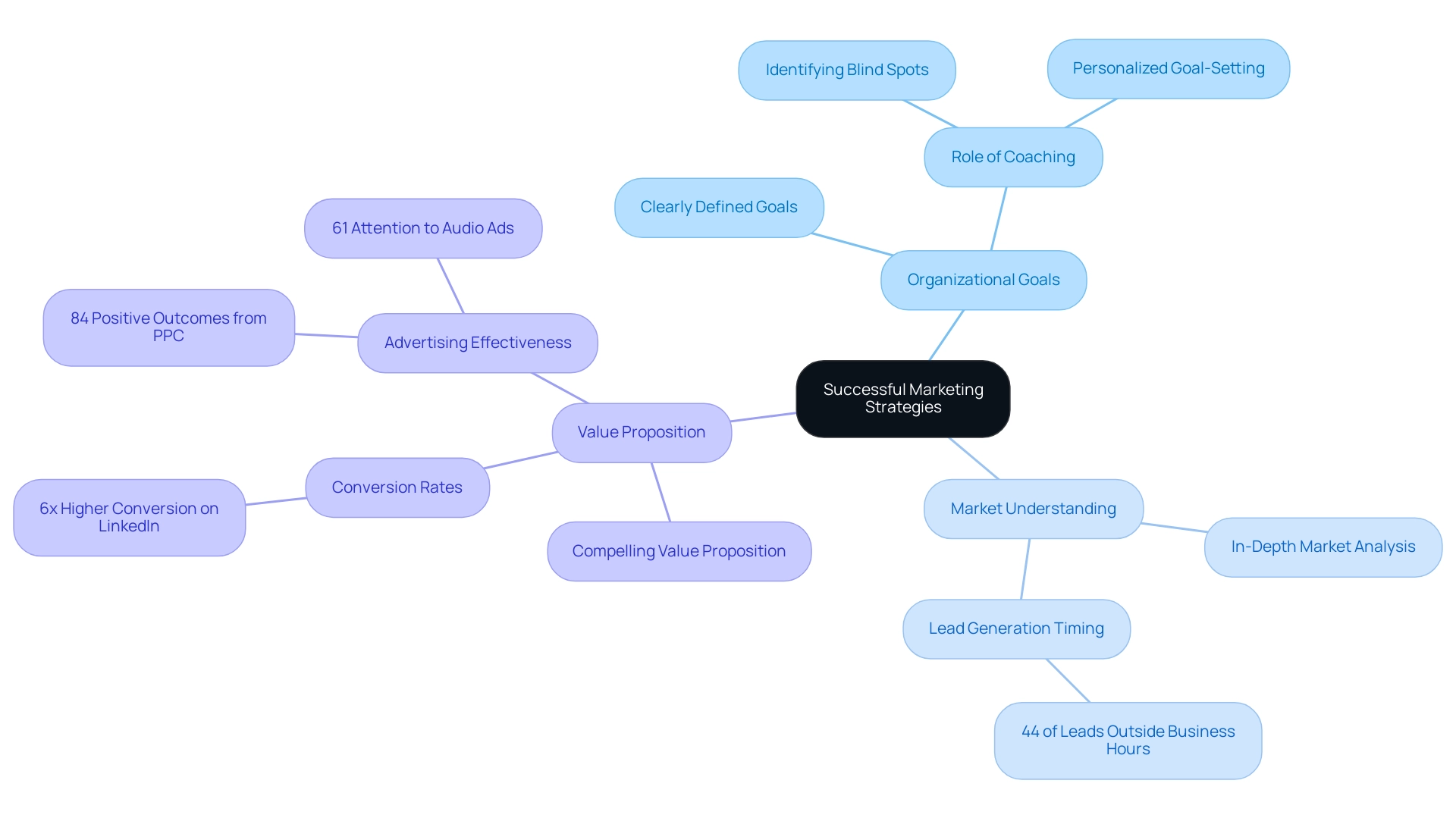
Step-by-Step Guide to Crafting Your Marketing Strategy
- Define Your Goals: Begin by pinpointing your promotional objectives. Are you looking to elevate brand awareness, drive sales leads, or enhance customer engagement? Clearly defined goals are essential strategies for marketing strategies for new business owners. Consider utilizing a dedicated goal management tool or framework, such as OKRs, to streamline this process and improve your outcomes.
- Conduct Market Research: Delve into an analysis of your industry landscape, competitors, and prevailing market trends. A thorough understanding of the current environment allows you to position your business strategically. Current best practices underscore the necessity of this research, as they provide insights into consumer behavior and preferences.
- Develop Your Unique Selling Proposition (USP): Articulate what differentiates your product or service from competitors. This unique message will be central to your promotional communications and is crucial for developing effective strategies for marketing strategies for new business owners to establish a strong brand identity.
- Choose Your Promotion Channels: Select the channels most effective for reaching your target audience. Consider employing a mix of social media, email promotion, and content creation as strategies for marketing strategies for new business owners to maximize engagement and visibility.
- Set a Budget: Clearly outline your promotional budget, ensuring that it aligns with your goals and selected channels. Remember, only 11% of managers feel their company’s strategic priorities are fully supported by necessary resources, highlighting the importance of effective budget allocation. This case study illustrates the real-world implications of resource management in achieving your promotional objectives.
- Create a Timeline: Develop a detailed timeline for your promotional initiatives. This should encompass stages for planning, execution, and review, enabling a structured approach to your promotional efforts.
- Review and Adjust: Regularly assess the effectiveness of your marketing strategies for new business owners by reviewing performance metrics and adjusting your strategies for marketing strategies for new business owners. A study by the Journal of Applied Psychology reveals that presenting weekly progress reports can boost your success rate by 40 percent. Integrating this practice into your routine not only enhances accountability but also ensures that your marketing strategy remains aligned with your goals and market trends.
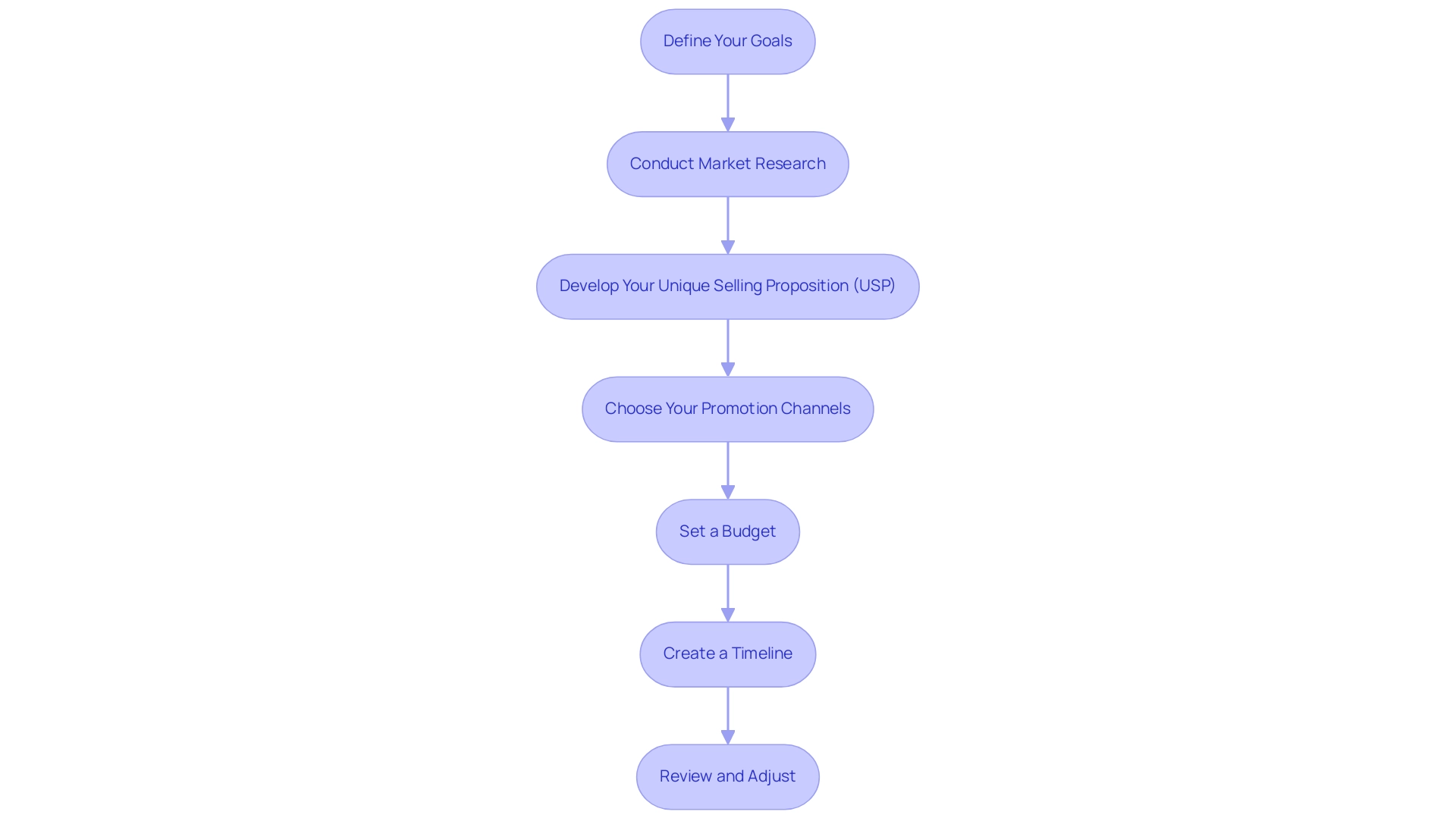
Identifying Your Target Audience: Key to Effective Marketing
Identifying your target market is a fundamental step in establishing a successful business. It requires a nuanced understanding of who your potential customers are, their needs, and how your offerings can effectively address their problems. Begin by collecting demographic data, including age, gender, income level, and geographic location.
This foundational information lays the groundwork for deeper insights into consumer behavior. Complement this with psychographic data—an exploration of the interests, values, and behaviors of your target group. Research indicates that 89% of consumers acknowledge that social media influences their holiday shopping decisions, highlighting the need to consider these platforms in your analysis.
Additionally, create detailed customer personas that encapsulate the various segments of your target market. Utilize tools such as:
- Surveys
- Social media analytics
- Comprehensive market research reports
to gather this crucial information. Engaging in customer interviews can also provide invaluable insights; a semi-structured format allows you to uncover deeper preferences and behaviors that can inform product development.
For instance, a case study on conducting customer interviews revealed that businesses gained significant insights into customer behavior and preferences, allowing for tailored product development that connects with their target market. Moreover, it’s noteworthy that 70% of viewers have made a purchase after seeing a brand on YouTube, emphasizing the platform’s pivotal role in shaping consumer decisions. The clearer your definition of your target group, the more effectively you can develop strategies for marketing strategies for new business owners to resonate with their specific needs and desires.
Remember, as you craft your strategies for marketing strategies for new business owners, that a well-defined target market not only enhances your promotional efforts but also increases your chances of building a loyal customer base. In a crowded marketplace, such as the handmade cosmetics industry, where the biggest competitor holds an 80% market share, understanding your target customers becomes even more critical to differentiate your offerings.
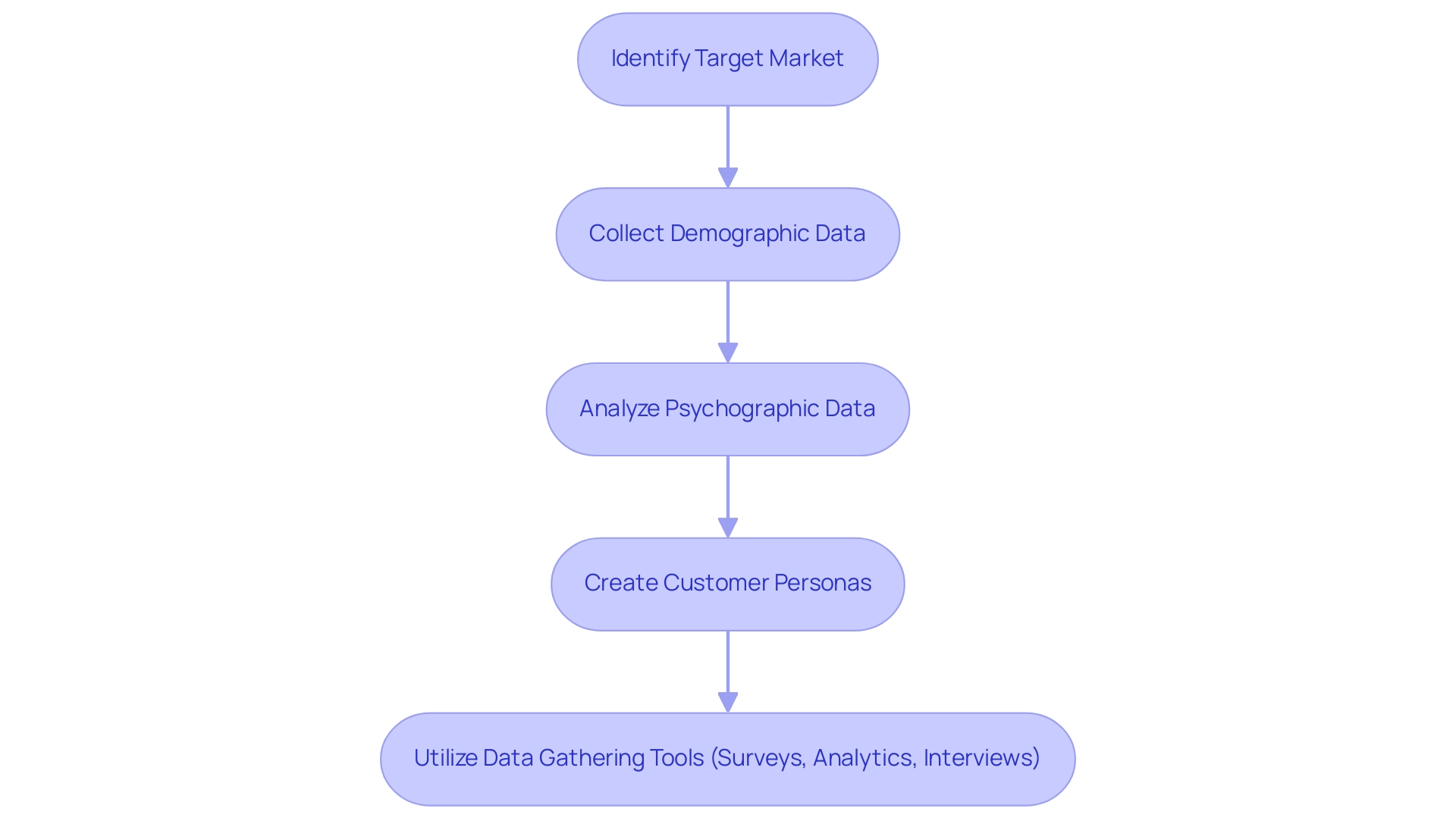
Choosing the Right Marketing Channels for Your Business
When selecting promotional channels, it’s vital to align your strategies for marketing strategies for new business owners with where your target audience is most engaged. Here are some key avenues to consider:
-
Social Media: Platforms such as Facebook, Instagram, and LinkedIn are pivotal for customer engagement and brand awareness. Notably, LinkedIn’s research indicates that individuals exposed to brand messages on their platform are six times more likely to convert, highlighting the platform’s effectiveness for B2B marketing.
Additionally, sector-specific insights from Rival IQ’s benchmarking tool reveal that engagement rates vary significantly across platforms, with Instagram generally outperforming Facebook. This information can assist you in developing strategies for marketing strategies for new business owners to maximize engagement on social media.
-
Email Marketing: This remains a formidable tool for nurturing leads and fostering customer relationships. Segmented email campaigns have been shown to drive 30% more opens and 50% more click throughs compared to their unsegmented counterparts, underscoring the importance of personalization in driving conversions. This statistic is particularly relevant as you consider how to engage potential clients effectively.
-
Content Marketing: Developing valuable content—such as blogs, videos, and infographics—positions your brand as an industry authority. This approach not only builds trust but also enhances organic reach. As marketers increasingly recognize the advantages of generative AI in creating personalized content, utilizing these tools can enhance your content promotion efforts.
-
Paid Advertising: Employing online ads, including Google Ads and social media promotions, can offer immediate visibility and precise targeting, making it an effective strategy for reaching specific demographics.
-
Networking and Events: Engaging in industry events or webinars allows you to build connections with potential customers and partners, creating opportunities for collaboration and growth.
Evaluate each channel’s potential return on investment (ROI) as part of your strategies for marketing strategies for new business owners, and select those that best align with your objectives and preferences. Incorporating insights from Rival IQ’s benchmarking tool can guide you in assessing your performance in 2024 and refining your approach to social media engagement.
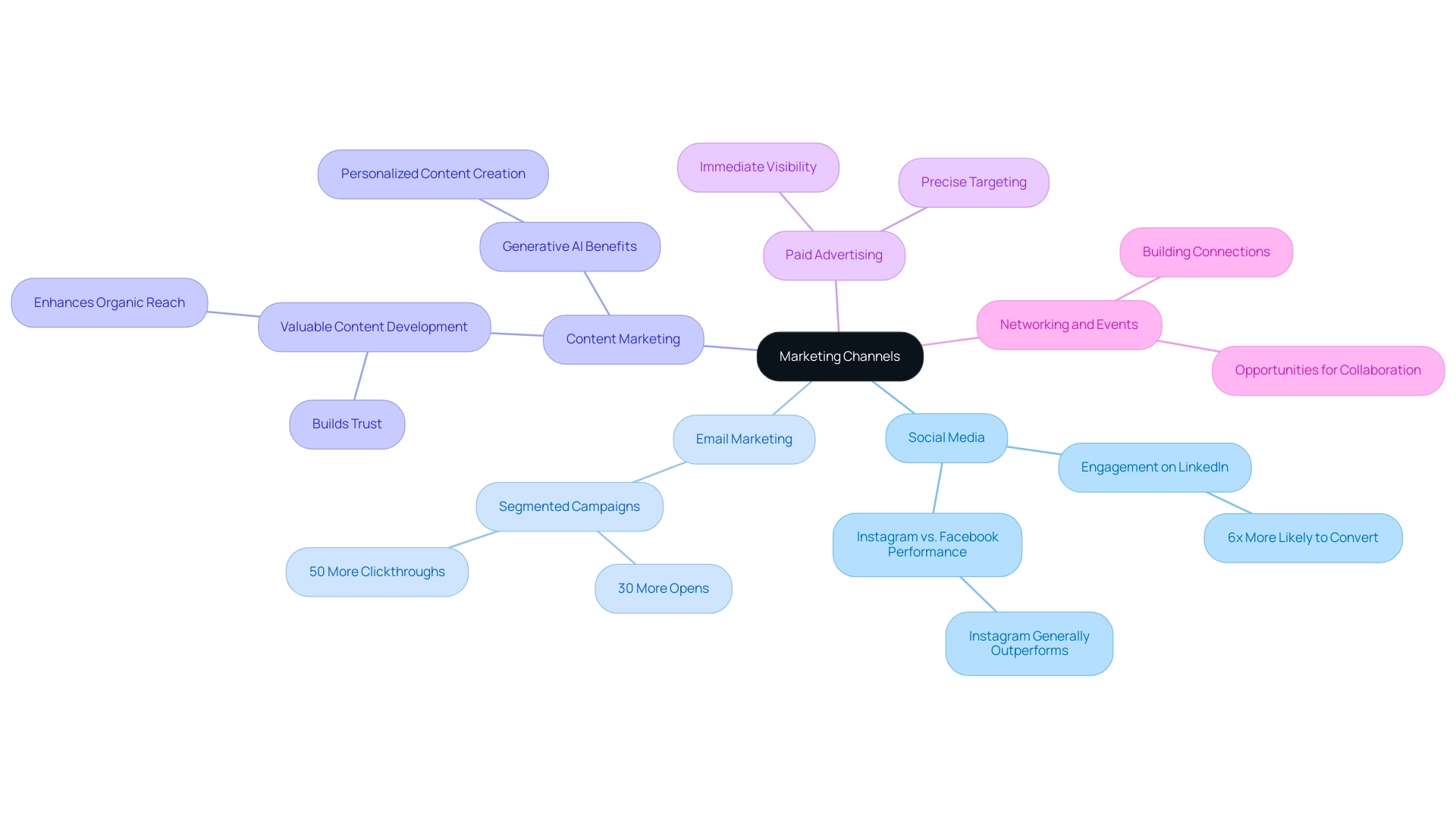
Measuring Success: Tracking and Adjusting Your Marketing Efforts
To effectively measure the success of your promotional efforts, it is crucial to establish key performance indicators (KPIs) that resonate with your business objectives. Fundamental KPIs include metrics such as:
- Website traffic
- Conversion rates
- Social media engagement
- Return on investment (ROI)
Utilizing robust tools like Google Analytics can provide you with actionable insights into the behavior and preferences of your viewers.
For instance, the click-through rate (CTR) is a vital statistic that measures how often audiences engage with your calls to action, highlighting the effectiveness of your promotional strategies. Recent reports indicate that businesses utilizing analytics tools are significantly more adept at making data-driven decisions that enhance performance. Regularly reviewing this data allows you to spot trends and identify areas that require improvement.
If a specific channel underperforms, it may be time to consider reallocating resources or experimenting with new promotional tactics. As Alex Birkett, Growth Marketing Manager at HubSpot, emphasizes, “Adopting a testing and learning mindset is essential.” This culture of continuous refinement maximizes your promotional effectiveness and positions you more strategically for future opportunities.
Additionally, examining case studies such as the use of Semrush’s Backlink Analytics can provide insights into how businesses assess their backlink profile and implement strategies to improve their SEO, thereby enhancing overall marketing success.
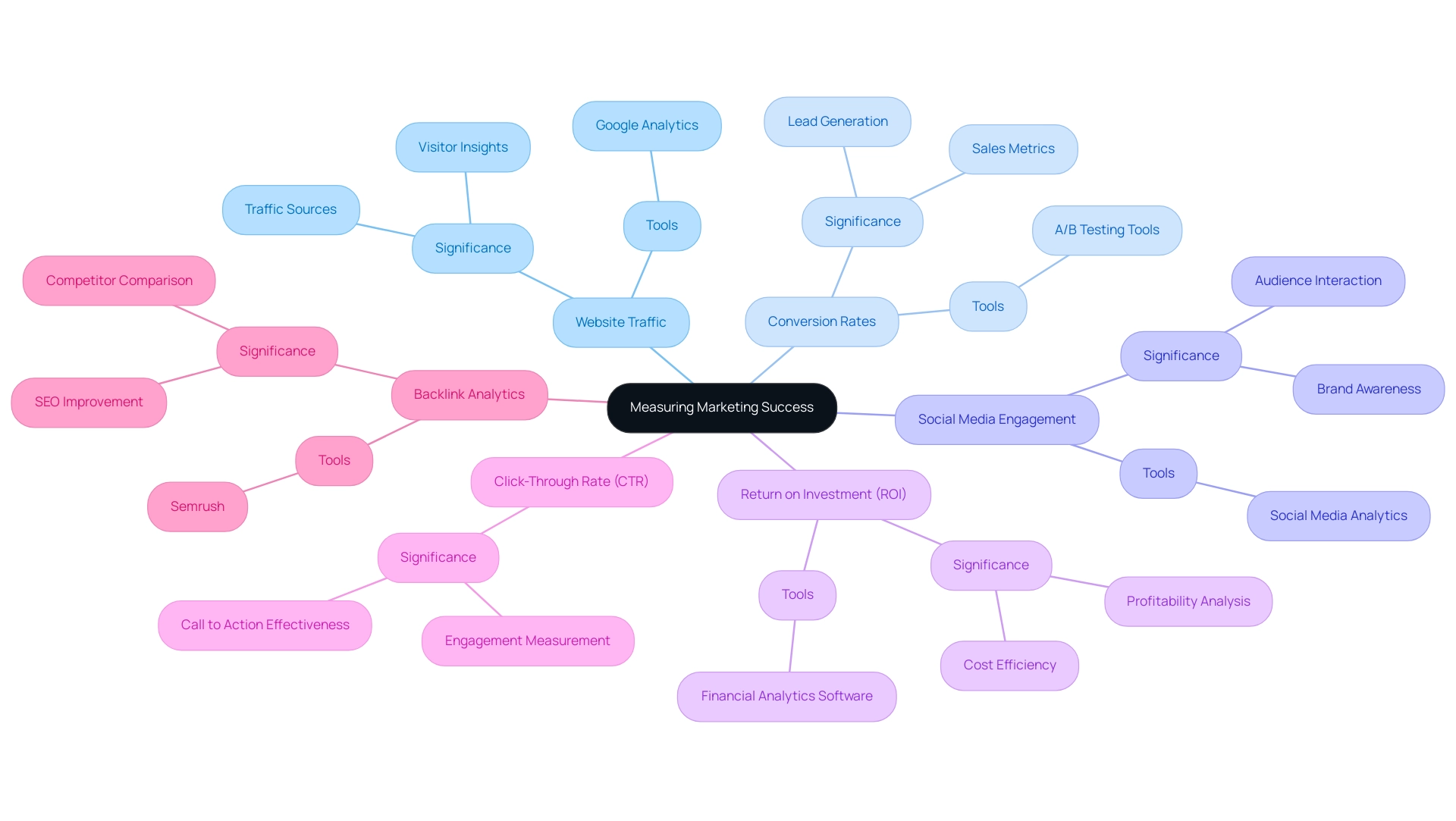
Conclusion
Crafting a successful marketing strategy is crucial for any business owner aiming to stand out in a competitive market. By defining clear goals, conducting thorough market research, and developing a unique selling proposition, entrepreneurs can create a solid foundation for their marketing initiatives. Understanding the target audience—through demographic and psychographic insights—enables businesses to tailor their messaging and offerings effectively, ultimately fostering customer loyalty.
Choosing the right marketing channels is equally important. Leveraging social media, email marketing, content creation, and paid advertising allows for diverse engagement opportunities that can maximize reach and impact. Regularly measuring success through key performance indicators ensures that businesses remain agile, adapting their strategies based on data-driven insights.
In a constantly evolving marketing landscape, flexibility and continuous learning are essential. Embracing these principles not only enhances marketing efforts but also aligns them with overarching business objectives. By investing time and resources into developing a comprehensive marketing strategy, business owners can navigate challenges confidently and pave the way for sustainable growth and success.
Frequently Asked Questions
What are the key components of a successful marketing strategy for new business owners?
The key components include clearly defined organizational goals, an in-depth understanding of the market landscape, and a compelling value proposition for your products or services.
How can coaching assist new business owners in their marketing strategies?
Coaching helps clarify entrepreneurial goals, identify blind spots, break problematic patterns, and personalize the goal-setting process, ultimately empowering business owners towards self-sufficiency.
What is the significance of LinkedIn in marketing efforts?
Interacting with brand messages on LinkedIn increases the likelihood of conversion by six times, highlighting the platform’s potential in promotional efforts.
What are the advantages of PPC advertising according to marketers?
84% of brands and marketers report positive outcomes from their PPC advertising campaigns, indicating its efficiency in reaching potential customers.
How has the average blog post length changed, and why is it important?
As of 2024, the average blog post length has increased to 1,427 words, reflecting a shift towards more in-depth content that effectively engages readers.
Why is it important to adopt flexible strategies in marketing?
Understanding that 44% of leads are generated outside traditional hours emphasizes the need for flexible strategies to capture interest when potential customers are most engaged.
What percentage of audio listeners pay attention to audio ads?
61% of audio listeners pay attention to audio ads, demonstrating the importance of diverse advertising channels.
What are the steps to define marketing goals for new businesses?
Define your goals by identifying promotional objectives such as elevating brand awareness, driving sales leads, or enhancing customer engagement.
Why is market research essential for new business owners?
Conducting market research provides insights into the industry landscape, competitors, and consumer behavior, allowing for strategic business positioning.
What should a unique selling proposition (USP) accomplish?
A USP articulates what differentiates your product or service from competitors and is crucial for developing effective marketing strategies and establishing a strong brand identity.
How should new business owners choose their promotion channels?
Owners should select the most effective channels for reaching their target audience, employing a mix of social media, email promotion, and content creation to maximize engagement.
What is the importance of setting a promotional budget?
A well-outlined budget ensures alignment with goals and selected channels, as only 11% of managers feel their company’s strategic priorities are fully supported by necessary resources.
What should a marketing timeline include?
A marketing timeline should encompass stages for planning, execution, and review, enabling a structured approach to promotional efforts.
How can business owners review and adjust their marketing strategies?
Regularly assessing performance metrics and presenting weekly progress reports can enhance accountability and ensure marketing strategies remain aligned with goals and market trends.


